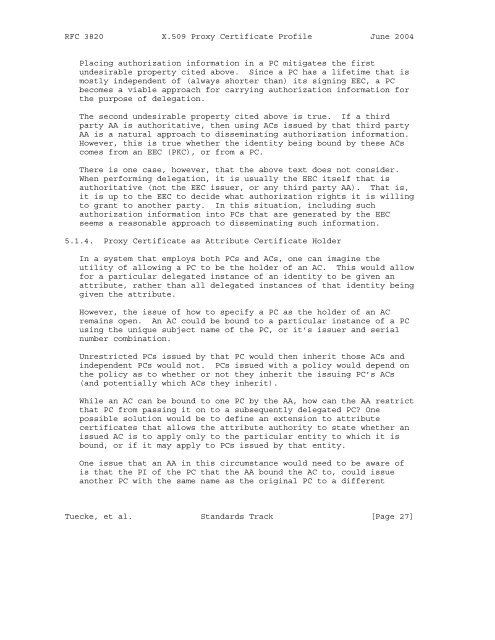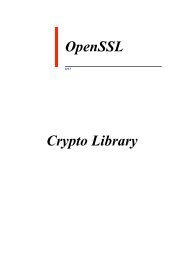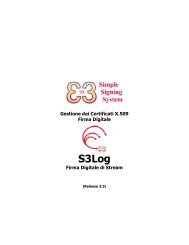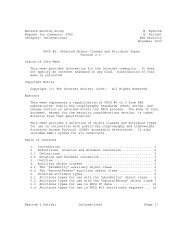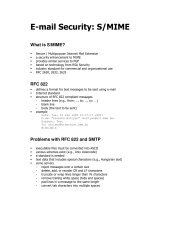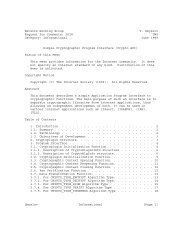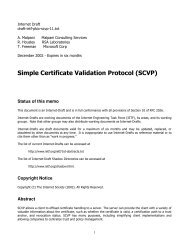Internet X.509 Public Key Infrastructure (PKI) Proxy ... - Clizio.com
Internet X.509 Public Key Infrastructure (PKI) Proxy ... - Clizio.com
Internet X.509 Public Key Infrastructure (PKI) Proxy ... - Clizio.com
Create successful ePaper yourself
Turn your PDF publications into a flip-book with our unique Google optimized e-Paper software.
RFC 3820 <strong>X.509</strong> <strong>Proxy</strong> Certificate Profile June 2004Placing authorization information in a PC mitigates the firstundesirable property cited above. Since a PC has a lifetime that ismostly independent of (always shorter than) its signing EEC, a PCbe<strong>com</strong>es a viable approach for carrying authorization information forthe purpose of delegation.The second undesirable property cited above is true. If a thirdparty AA is authoritative, then using ACs issued by that third partyAA is a natural approach to disseminating authorization information.However, this is true whether the identity being bound by these ACs<strong>com</strong>es from an EEC (PKC), or from a PC.There is one case, however, that the above text does not consider.When performing delegation, it is usually the EEC itself that isauthoritative (not the EEC issuer, or any third party AA). That is,it is up to the EEC to decide what authorization rights it is willingto grant to another party. In this situation, including suchauthorization information into PCs that are generated by the EECseems a reasonable approach to disseminating such information.5.1.4. <strong>Proxy</strong> Certificate as Attribute Certificate HolderIn a system that employs both PCs and ACs, one can imagine theutility of allowing a PC to be the holder of an AC. This would allowfor a particular delegated instance of an identity to be given anattribute, rather than all delegated instances of that identity beinggiven the attribute.However, the issue of how to specify a PC as the holder of an ACremains open. An AC could be bound to a particular instance of a PCusing the unique subject name of the PC, or it’s issuer and serialnumber <strong>com</strong>bination.Unrestricted PCs issued by that PC would then inherit those ACs andindependent PCs would not. PCs issued with a policy would depend onthe policy as to whether or not they inherit the issuing PC’s ACs(and potentially which ACs they inherit).While an AC can be bound to one PC by the AA, how can the AA restrictthat PC from passing it on to a subsequently delegated PC? Onepossible solution would be to define an extension to attributecertificates that allows the attribute authority to state whether anissued AC is to apply only to the particular entity to which it isbound, or if it may apply to PCs issued by that entity.One issue that an AA in this circumstance would need to be aware ofis that the PI of the PC that the AA bound the AC to, could issueanother PC with the same name as the original PC to a differentTuecke, et al. Standards Track [Page 27]


